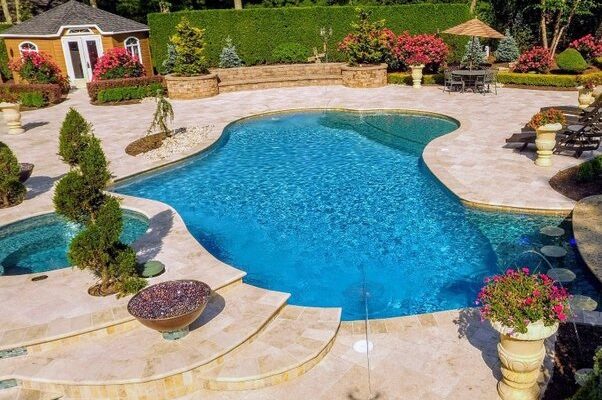Swimming pools are expensive, therefore many people want greener methods to use them. Building pools using eco-friendly materials saves money, benefits the environment, and enhances the neighbourhood. There are several eco-friendly pool designs. Solar heating, water saving, and green building materials are emphasised.
Eco-Friendly Material Choice
Pool materials must be chosen carefully for sustainability. Traditional building materials like concrete can hurt the environment during production. Eco-friendly options include natural stone, recycled glass tiles, and responsibly sourced wood. Recycling glass lowers trash and improves the pool. Natural stone is more expensive but lasts longer and mixes better, making it greener.
Pool Surfaces and Liners Differ
Eco-friendly pools have modern liners and flooring. Sustainable vinyl and fibreglass are becoming more popular. These materials are recyclable, resilient, and low-maintenance. Some companies make eco-friendly recyclable pool liners.
Features That Save Water
Water conservation is essential for sustainable design for custom pools Charleston. Water-saving measures reduce pool water use. Covering the pool helps. Evaporation is prevented by pool covers, saving hundreds of gallons annually. Avoiding waste minimises chemical use and increases cleaning frequency. A rainwater collection system saves water. Rainwater collection fills and maintains the pool. This technique reduces city water use and preserves water for the environment.
Effective Filtration
Most pool cleaning methods waste energy and are wasteful. Upgrade your pool cleaning to extend its life. Varying-speed pumps use less energy than single-speed ones. They utilise less energy by adapting speed to pool needs. Bio-filter systems, or natural pool filtration, are becoming more popular. These devices filter pool water without chemicals using plants and biological organisms. Swimming is better for skin and the environment.
Heating with the Sun
Heating is a high-energy pool maintenance operation. Sun heaters are eco-friendly and can replace gas or electric ones. Rooftop or poolside solar panels heat the water. This method cuts energy use and power expenses. Solar cells, blankets, and pool covers retain heat. Without power, these coverings keep pool water warm. They retain solar heat throughout the day and prevent loss at night.
Chemical-Free Pool Maintenance
Pool water is cleaned with numerous chemicals. Replace them with eco-friendly materials. Saltwater chlorination uses electrolysis to produce chlorine. UV and ozone equipment clean pool water safely. Chemical manufacturing and disposal are less harmful and swimming is safer and more fun with these approaches.
Landscaping and Pool Surrounds
Planting around your pool may prolong its life. Use drought-tolerant local plants and landscaping to save water and work. Pool deck pavement is permeable to rainwater. This reduces runoff and recharges groundwater. Greener pool edges and decks can be created using recycled or local materials. These materials have less environmental impact than long-distance ones.
Conclusion
Sustainable pools require careful material, design, and upkeep. Solar heating, water-saving measures, recyclable materials, and great filtration systems can help homeowners design a beautiful, eco-friendly pool. Environmentally friendly pools make swimming healthier and more enjoyable.




